Monthly Azure news March 2022
In this blogpost you’ll read about the latest news from the Azure and Cloud-Native universe. We look forward to your comments, shares, engagement.
Contents
- New option available for Azure Static Web Apps configuration
- Microsoft Azure helps to keep a sharp eye on the costs
- Shutting down TLS 1.0/1.1 for Azure DevOps is planned for March 31, 2022
- New features available for Azure Chaos Studio
- Preview of the new security feature for Azure API Management
- Premium Tier finally available for Azure SignalR as a public preview
- On-demand Compute Capacity Reservation has been shortly released
- App Service Environment version 1 and 2 getting retired in August 2024
- Azure DevOps Boards Modernization is available as an official public preview now
- Azure Cosmos DB news
- Azure Kubernetes Service news
- Important information about Node.js versions
- The new Azure Front Door is available now
- Extended support for .Net Core 3.1 expires on 3 December 2022
- Azure SDK retirement
- Azure DevOps Artifacts support more upstream sources
- Azure QnA Maker should be replaced through Question answering until March 2025
- Application Insights: Support for instrumentation key-based global ingestion expires 2025
- Support of multiple databases per data connection available now
- The Terraform Azure Resource Manager Provider 3.0.2 has been released
- We’re part a of Global Azure 2022 in May
New option available for Azure Static Web Apps configuration
Azure Static Web Apps provide a set of parameters that can be configured in the staticwebapp.config.json file. An additional parameter for specifying an API language runtime version has been released shortly. Here is an example of how to use the parameter:
{
"platform": {
"apiRuntime": "python:3.9"
}
}
Supported values overview:
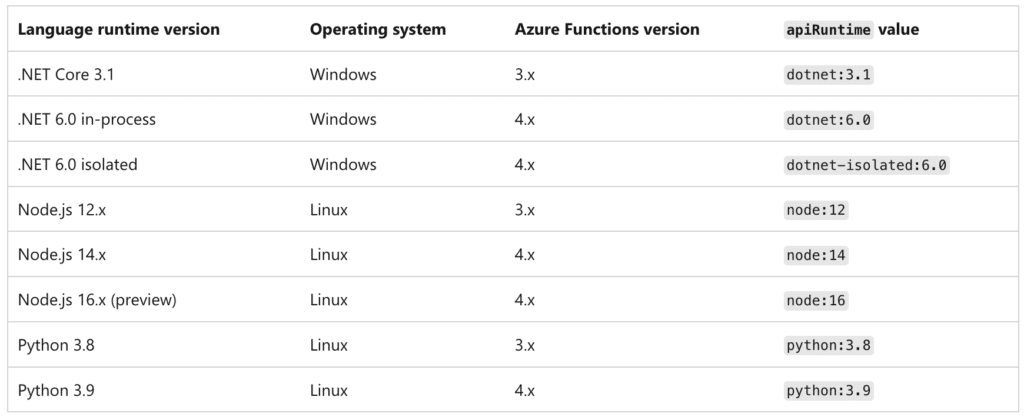
Microsoft Azure helps to keep a sharp eye on the costs
Scheduling automated email alerts for changes on saved cost views will be available soon (currently in public preview). While subscribing to the changes there is a choice to choose between the daily, weekly, or monthly updates and an option for sharing the cost views with people outside the portal. For more information, please refer to the article.
Shutting down TLS 1.0/1.1 for Azure DevOps is planned for March 31, 2022
The second attempt to turn off the weak standards TLS 1.0 and 1.1 will take place on March 31, 2022.
The first attempt has been partially rolled back because of customers connected over the IPv4 endpoint (due to compatibility issues). Microsoft pointed out that only a low percentage of customers faced an impact and offered two test days for these customers where TLS 1.1/1.0 has been turned off for half of the day to test the software.
How to check the TLS 1.2 compatibility and how to enable TLS 1.2 are described briefly in this blog post.
New features available for Azure Chaos Studio
Azure Chaos Studio, a platform for simulating faults and outages via Chaos Engineering, has been extended by two new options:
- Key Vault Deny access fault (preventing an application from retrieving content from the Key Vault)
- Classic Cloud Services Shutdown fault (simulates service failure)
All details of existing faults can be found here. These faults can be added to an experiment. Now an experiment can be created using ARM templates or REST API. Microsoft is also going to introduce an experiment designer in the next weeks.
Preview of the new security feature for Azure API Management
Azure Private Link enables private and secure communication between the customer’s virtual network and the API Management gateway.

The main advantages are:
- private access from Azure Virtual Network resources peered and on-premises networks
- Built-in data exfiltration protection for Azure resources
- Predictable private IP addresses for PaaS resources
- Consistent and unified experience across PaaS services
There are also some limitations due to the preview state of the feature: read in this article.
Detailed documentation on Azure Private Link can be found here.
Premium Tier finally available for Azure SignalR as a public preview
Often asked features of the Premium Tier for Azure SignalR are available now as a preview – availability zone support, disaster recovery functionality, and autoscaling.
Zone redundancy is enabled while creating or upgrading to a Premium tier resource (upgrading from Standard to Premium happens without downtime). More information about zone redundancy can be found here.
Disaster recovery option offers multiple SignalR service instances and automatically switches to other instances when some of them are not available, described here.
Autoscaling option which is now available for the Premium Tier allows managing high load and idle times by adding or removing resources based on the defined rules.
A short overview of the available SignalR tiers:
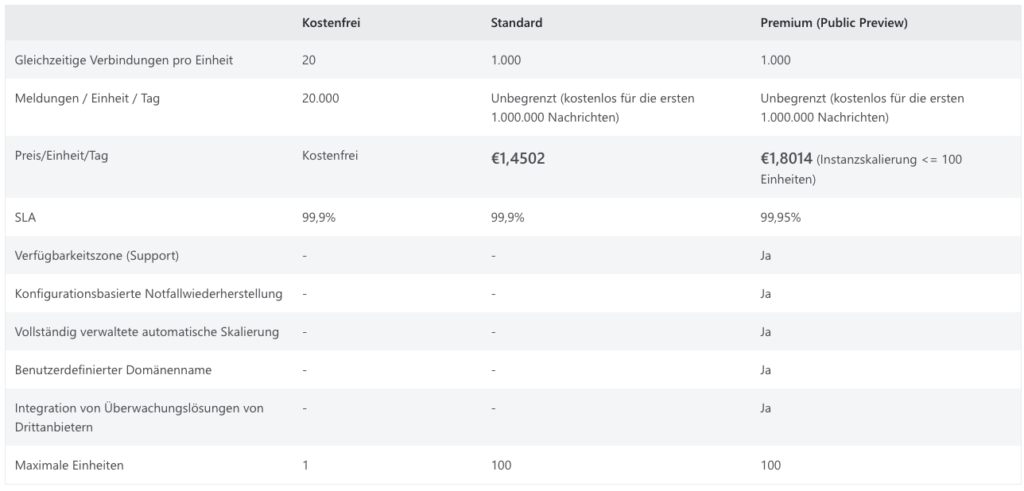
On-demand Compute Capacity Reservation has been shortly released
Both, Reserved Virtual Machine Instance (RI) and On-Demand Capacity Reservation, are relevant to Azure VMs. These features allow setting aside compute capacity in an Azure region for a defined duration of time. The main differences between On-demand Capacity Reservation and RIs are:
- no long-running attachment to the reservation (RIs commitment lasts 1 or 3 years)
- RIs “only” offer “capacity priority” but no guarantee, On-demand Capacity Reservation provides a guarantee
- On-demand Compute Reservation works with the pay-as-you-go principle (depends on the underlying VM size) whereas the long-term commitment of the RIs notably lowers the costs
Documentation on how On-demand Capacity reservation works and what are current limitations can be found here.
App Service Environment version 1 and 2 getting retired in August 2024
7 months after the announcement of getting retired for the Azure Cloud Services (classic) Microsoft published a new update – App Service Environment version 1 and 2 will also retire in summer 2024. Starting March 2022 customers have a bit more than two years to migrate to App Service Environment version 3.
A short comparison between the old and the updated version can be found here.
Azure DevOps Boards Modernization is available as an official public preview now
The first attempt to release the public preview was done in November 2021. The feedback was not only positive as can be read in the comments to the first release announcement. So, the development team fixed a lot of reported bugs and is proud to announce another version of the “New Boards Hub”, now as an official public preview.
The customers are encouraged to try out the new Azure DevOps boards hub and to provide feedback about their experience. It will help the dev team to finalize the version which will be available as a final release this summer. A link to a source.
Azure Cosmos DB news
Finally, Always Encrypted for Azure Cosmos DB is generally available. With this feature, sensitive entries will be encrypted before saving in the database.
Another important feature that is currently in a public preview is the Azure Cosmos DB Partition Key Advisor notebook. It supports you while choosing the best partition key for the database workload. The advisor needs the information about the typical workload and some suitable keys to be able to analyze and rank the candidates Some further information find here.
Azure Kubernetes Service news
- Capacity reservation support is in public preview now.
- Also in a public preview is the Azure Dedicated Host support for Azure Kubernetes Service. Dedicated Host offers a physical server (hardware isolation) for only your own virtual machines and provides you control over maintenance events.
- AKS Node Auto drain: If an agent node has received a scheduled event (like Redeploy, Preemt, Terminate, or others) it will now be automatically drained by AKS to avoid unexpected disruption. Find more information here.
Important information about Node.js versions
Node 14 LTS (long-term support) expires in one year on 30 April 2023. After the expiration date, the applications will keep running but no patches or services will be available for the unsupported version.
Customers who are using Node 14 should update the applications to Node 16 LTS before the expiration date. Here is an overview of the Node.js lifecycle:
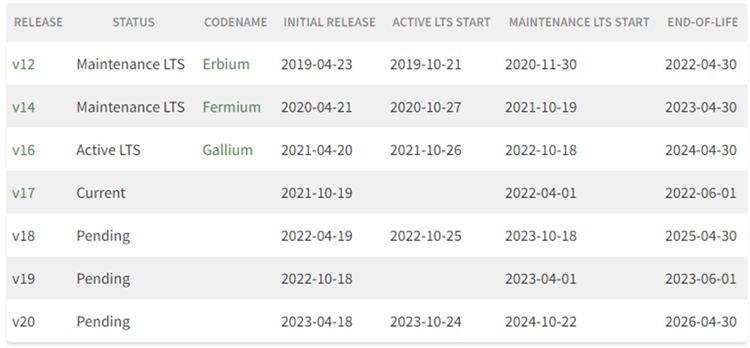
The new Azure Front Door is available now
Azure Front Door has been announced by Microsoft as the enterprise content delivery network but due to some not covered customer demands the “new Azure Front Door” has been released a couple of days ago. The new Azure Front Door offers two tiers – standard and premium.
Do not be confused: the “old” Azure CDN is now called “Azure CDN from Microsoft (classic), the “old” Azure Front Door is called now “Azure Front Door (classic)”, the newest release is called “Azure Front Door”.
Key advantages of the new version are for example expanded Private Link support, Web Application Firewall, enhanced analytics and logging options, an easier cost model, and some more.
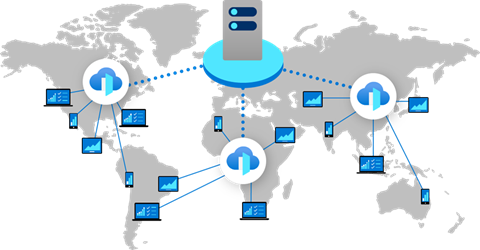
Extended support for .Net Core 3.1 expires on 3 December 2022
Applications that are hosted on Functions will keep running but no important patches or services for the outdated version will be available – update the Functions to the runtime 4.x version (uses .Net 6) is required.
App Service is affected by the .Net Core 3.1 support expiration as well. Applications that are hosted on App Service will continue running but again no support will be available. App Service applications should be updated to use .Net 6.
Azure SDK retirement
Older libraries are running out of support. To prevent issues due to missing security or performance updates to the Azure SDK, the outdated libraries should be upgraded to the newest version by 31 March 2023. For further information please refer to this article.
Azure DevOps Artifacts support more upstream sources
A couple of days ago Microsoft announced that Azure DevOps Artifacts now supports Google Maven Repository, Jitpack, Gradle Plugins, and PowerShell Gallery as upstream sources. This blog describes how to enable one of them as an upstream source in a new or existing feed.
Azure QnA Maker should be replaced through Question answering until March 2025
Customers who use Azure QnA Maker have (starting now) 3 years to switch from QnA Maker to the Azure Cognitive Service for Language feature called Question answering. Custom question answering offers the same features as the QnA Maker and some further options.
Please refer to this article to get more information about the required action.
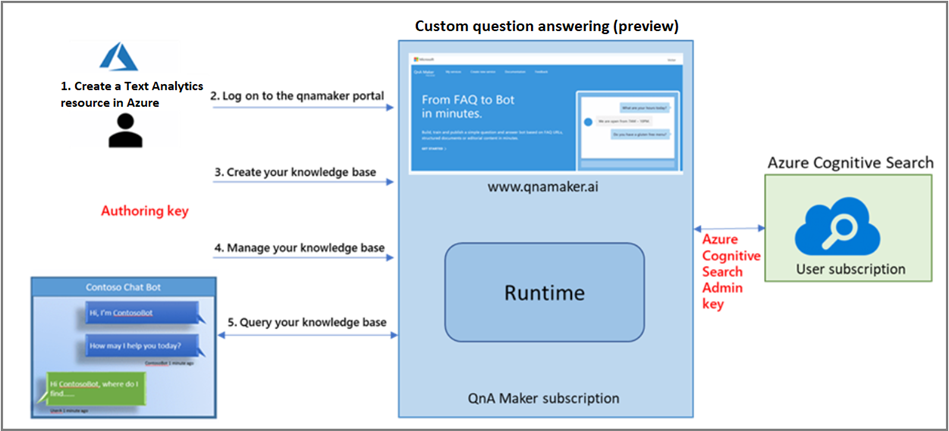
Application Insights: Support for instrumentation key-based global ingestion expires 2025
Migration from Application Insights instrumentation keys to connection strings is required due to the end of support for instrumentation key-based global ingestion by 31 March 2025.
Here is a detailed step-by-step guide for a successful migration.
Support of multiple databases per data connection available now
Azure Data Explorer provides support for multiple databases per data connection. To use this option the connection should be first set as a multi-database data connection. It can be done in Azure Portal, using ARM template, C#, or Python. Please refer to the documentation for more details.
The Terraform Azure Resource Manager Provider 3.0.2 has been released
End of March HashiCorp published the new version of the Terraform Azure Resource Manager Provider. The new release contains a lot of features, enhancements, and bug fixes. For the upgrade information please refer to the official documentation.
The latest version can be found here.
We’re a part of Global Azure 2022 in May
Join us at our on-site event after a long time in Stellwerk18 on May 7th. Our team will explain to you the development based on cloud native technologies such as Kubernetes or Azure services and show you how to modernize existing applications and develop new ones. Here we will explain the basics. You can then expand your knowledge in a hands-on manner in a prepared hands-on lab using realistic examples.
